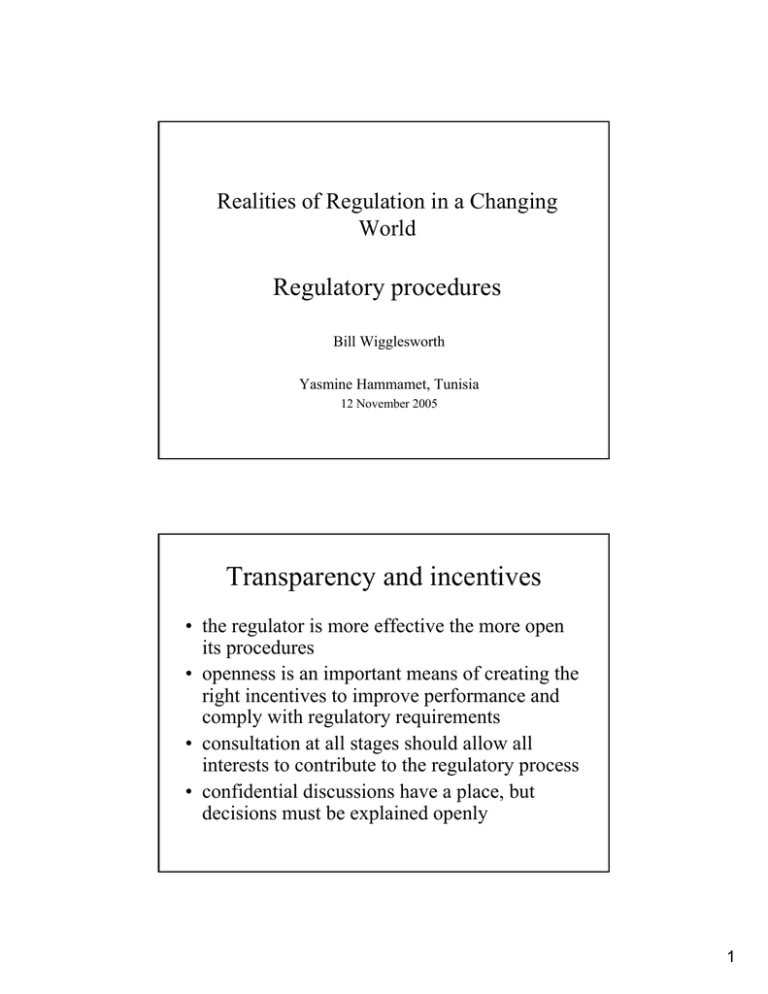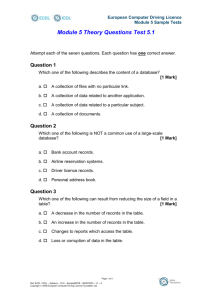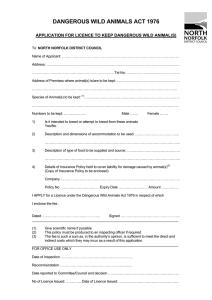Transparency and incentives Regulatory procedures Realities of Regulation in a Changing World
advertisement

Realities of Regulation in a Changing World Regulatory procedures Bill Wigglesworth Yasmine Hammamet, Tunisia 12 November 2005 Transparency and incentives • the regulator is more effective the more open its procedures • openness is an important means of creating the right incentives to improve performance and comply with regulatory requirements • consultation at all stages should allow all interests to contribute to the regulatory process • confidential discussions have a place, but decisions must be explained openly 1 Regulatory challenge of compliance and enforcement • securing and enforcing strict compliance is an essential element of regulation • without it regulation will be ineffective • direct inspection and enforcement by the regulator likely to demand excessive resources • strong powers of enforcement are necessary • but should only be used as last resort • emphasis should be on companies in the sector ensuring their own compliance Relationship with incumbent • main difficulty likely to arise with the incumbent: always in powerful position • due to strategic importance, threats of drastic action (e.g. licence revocation) may be ignored • need to create incentives to ensure compliance • approach should be part of on-going relationship stressing mutual interest and advantage in success of regulatory regime • relationship has to be managed on both sides 2 Managing the relationship • within incumbent, managing the relationship is the prime task of the company’s Regulatory Affairs Department (RAD) • the RAD needs to match the skills of the regulatory body and develop effective relations with it at working level • the RAD must also command the respect of top management and develop good communications throughout the company • should set up specific Compliance Unit Pressures on incumbent to comply • • • • • • this Unit will identify the need for compliance licence requirements and sanctions threat or opportunity virtue out of necessity company ethics and standing effective internal compliance avoids regulatory intervention • compliance Unit responsible for enabling company to respond effectively 3 Elements of an effective compliance programme • • • • well defined roles and responsibilities education and training monitoring mechanisms independent audit Roles and responsibilities • Regulatory Affairs Department • line Management • internal audit (or other independent monitoring body) 4 Regulatory Affairs • • • • specify levels of compliance develop and manage programme ‘help desk’ for advice represent incumbent before regulator on compliance issues • commission internal and external audit/surveys of compliance • investigate compliance failures Line management • champion compliance: lead by example • ensure implementation of compliance programmes • ensure awareness of licence requirements and where to seek guidance • include compliance in job descriptions • take corrective action following breaches • implement effective sanctions 5 Internal Audit • build compliance into operational audit processes • carry out independent surveys as necessary • provide independent verification to Board • escalate breaches where identified Education and training • awareness specific to needs of job • guidelines to interpret licence • select appropriate delivery mechanism: • • • • handbooks quick reference cards desk training distance learning (CDROM/video/audio) • continuous training framework: • • • induction generic job specific 6 Monitoring • Internal • • • • audit of implementation of programme confirmation that compliance embedded through operational audit reports to Compliance Committee; Board escalate compliance failures • External • mystery shopping Enforcement • failures in compliance will occur • prompt acknowledgement and corrective action will enhance respect for company • graduated sanctions should be available to reflect seriousness of breach, e.g.: – reprimand; order (enforceable in the courts); fine; licence amendment; threat of licence cancellation • maintain a positive approach towards future action 7 Graduated sanctions • • • • • • a brief word formal letter (perhaps press statement) red frightener: “minded to make an order” order (plus press statement) enforcement in court: formal court order breach of court order: contempt of court (unlimited penalties) • fine: up to 10% of annual turnover • licence revocation (recommendation to Minister) Other powers • Investigation: – full powers to obtain information from anyone – applied with discretion, subject to safeguards • Publication: – power to publish information for the benefit of users or competitors • Licence amendment: – may be need to change rules, without agreement of licensee – subject to appeal 8 Appeals • right of appeal to an independent body is an essential element in regulation • mechanism should ensure that: – due process is followed – powers are not exceeded – decisions are essentially reasonable • but it should avoid: – re-making the quasi- judicial decision by the expert regulator, unless this appears essential – becoming an automatic part of the process 9



